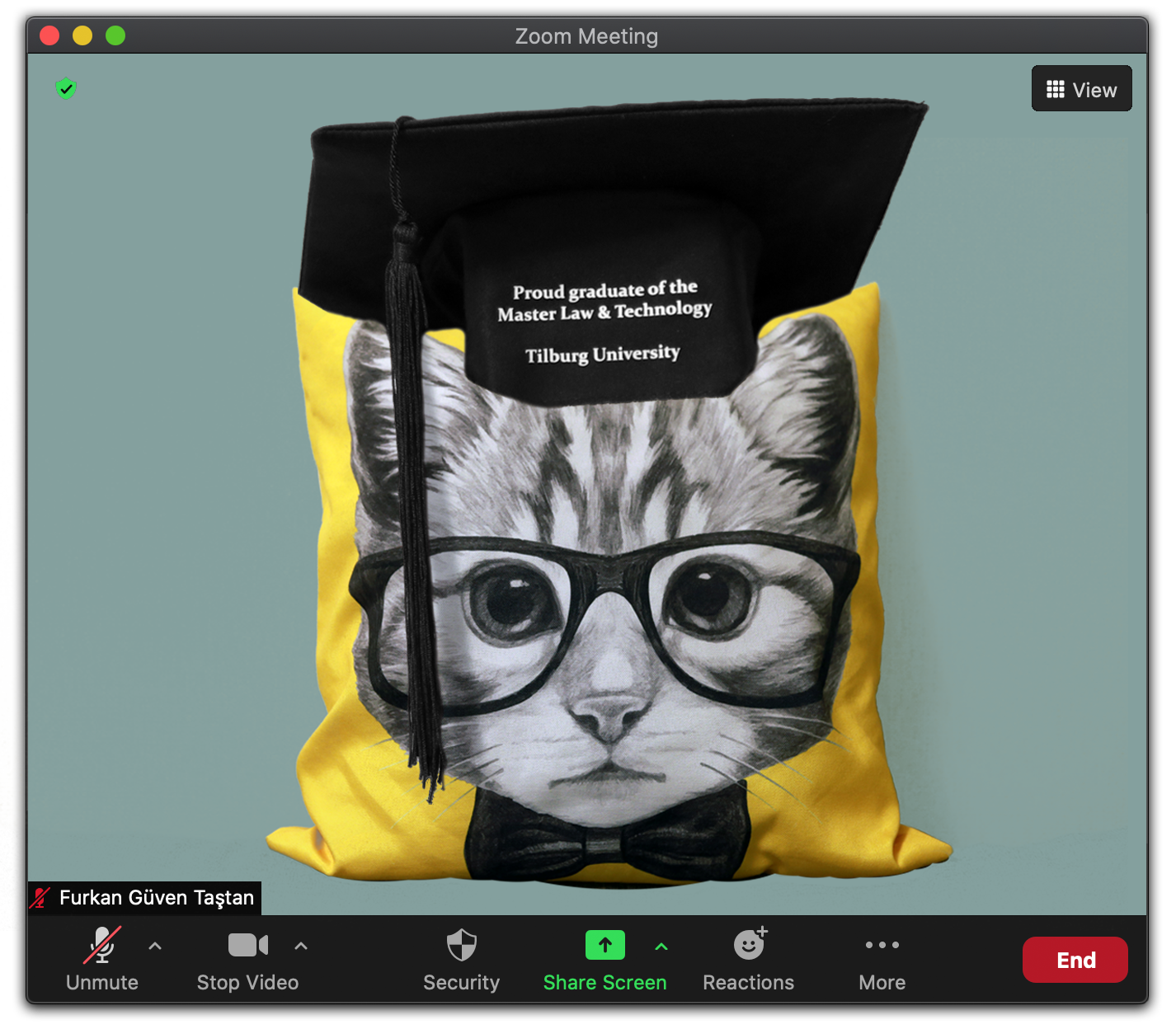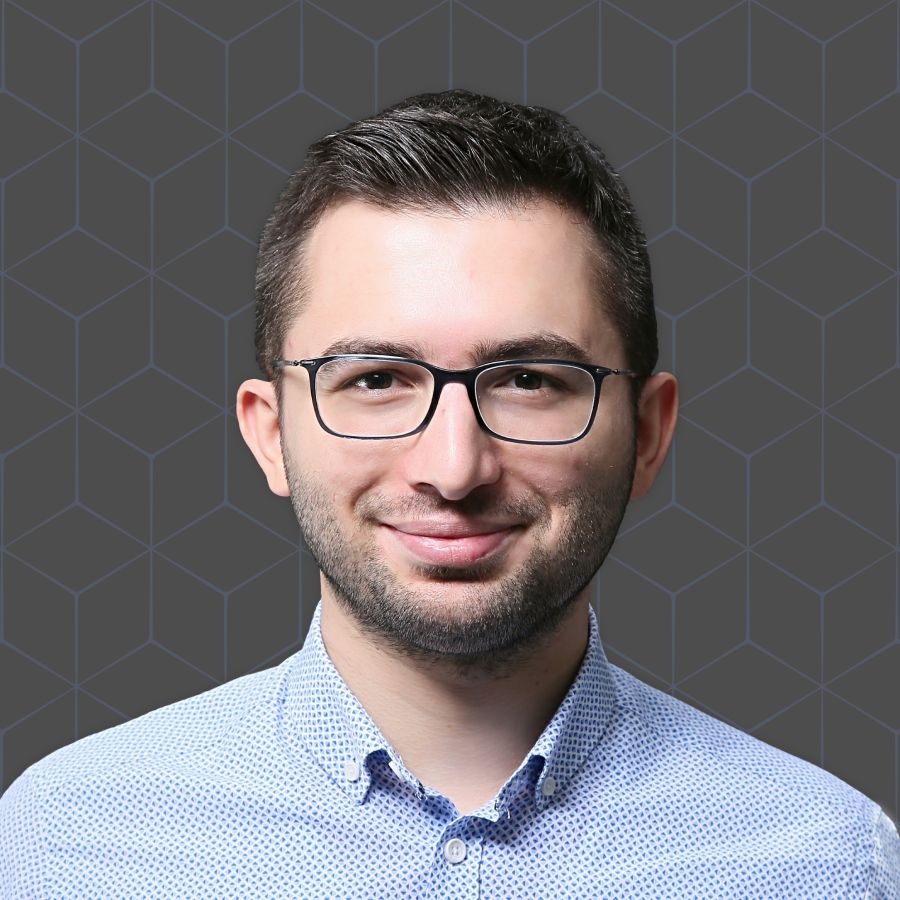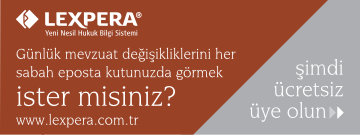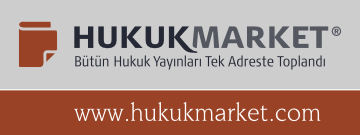The interplay between law and technology has gained prominence in the digitally driven world. World-renowned universities have offered master programs in this field. Although Tilburg University (TiU) initiated this program for international students in the 1990s, I could not find a comprehensive review and decided to write about the program myself.
To begin with, my journey in Tilburg started with the news that I was promoted for the Jean Monnet Scholarship from the European Commission. I was very excited to receive education from respected lecturers in a well-known institute, Tilburg Institute for Law, Technology, and Society (TILT), and one of the best law schools (#20 in law, THE-2022). TILT is one of the most prestigious institutes at the intersection of law and technology. Almost 75 researchers have been working in various fields at the crossroad of law and technology within this institute. On the other hand, I also realised that COVID19 would shadow my academic and non-academic activities in Tilburg.
During the year I was in Tilburg, I took notes about methods on instructional design, issues that should be criticised, and other inspirational points I learned from this journey. Following my graduation with the thesis "The (im)possibility of personal data as an object of contracts: An analysis of the GDPR and the Digital Content Directive", the time has come to systematise my notes and to give prospective students a general overview of the program from the perspective of a recent alumnus. As a preliminary remark, I should highlight that it is definitely worth registering for this program if you are interested in the intersected area of law and technology. Most of my expectations were met in this program. Yet, I also have minor concerns. Let’s look at both:
Hats off to Tilburg University's Instructional Design
I somewhat had experienced the online education in Turkey from the standpoint of a lecturer. As a student of this master program, I realised that online education is not limited to simply connecting students with lecturers on conductive wires of the internet. Online education should be designed. It should be designed by universities and lecturers, together. TiU and Law & Tech lecturers have certainly accomplished this task.
I should mention one of the features of a well-designed online educational system provided by the university. TiU Canvas system provides each student with a tailor-made digital calendar. This calendar shows all live sessions, deadlines of assignments and exams with details on your smartphone, tablet, or computer. It is updated every 15 minutes, ensuring students would not miss anything regarding the program. Having a digital calendar in the COVID19 pandemic is precious because you are at home without any physical reminders, such as your colleagues on campus.
More importantly, the course and lectures should be designed by the lecturer. I should refer to Dr. Leonie Reins's interview at this point. She highlighted two key lessons that emerged from the designing process of online courses. These were that i) classical knowledge transfers should not take place in live sessions, and that ii) going online actually has advantages because lecturers can provide students with mini-video clips and materials, allowing them to prepare for plenary sessions.
Prof. Dr. Ronald Leenes and Dr. Leonie Reins illustrated epitomes of instructional design in their course, namely REAL ("Regulation: Ethics, Accountability, Legitimacy"). For example, the first slide of Leenes’s remarked on the online rules about lectures: "Cameras on, mute yourself". The second slide on each lesson generally gave students the schedule, including a detailed break-down of the lecture into ten-minute parts. Furthermore, his slides had aesthetical view covering Helvetica and coherent pastel colours. Regarding the course design, Dr. Leenes's syllabus included links to mini knowledge clips (10 to 20 minutes) recorded by him and generally consisting of basic information about the lecture topic. Students were able to grasp the essential points with these clips prior to the lecture and be ready to discuss on a more advanced level in live sessions. These absolutely enhanced the quality of the course.
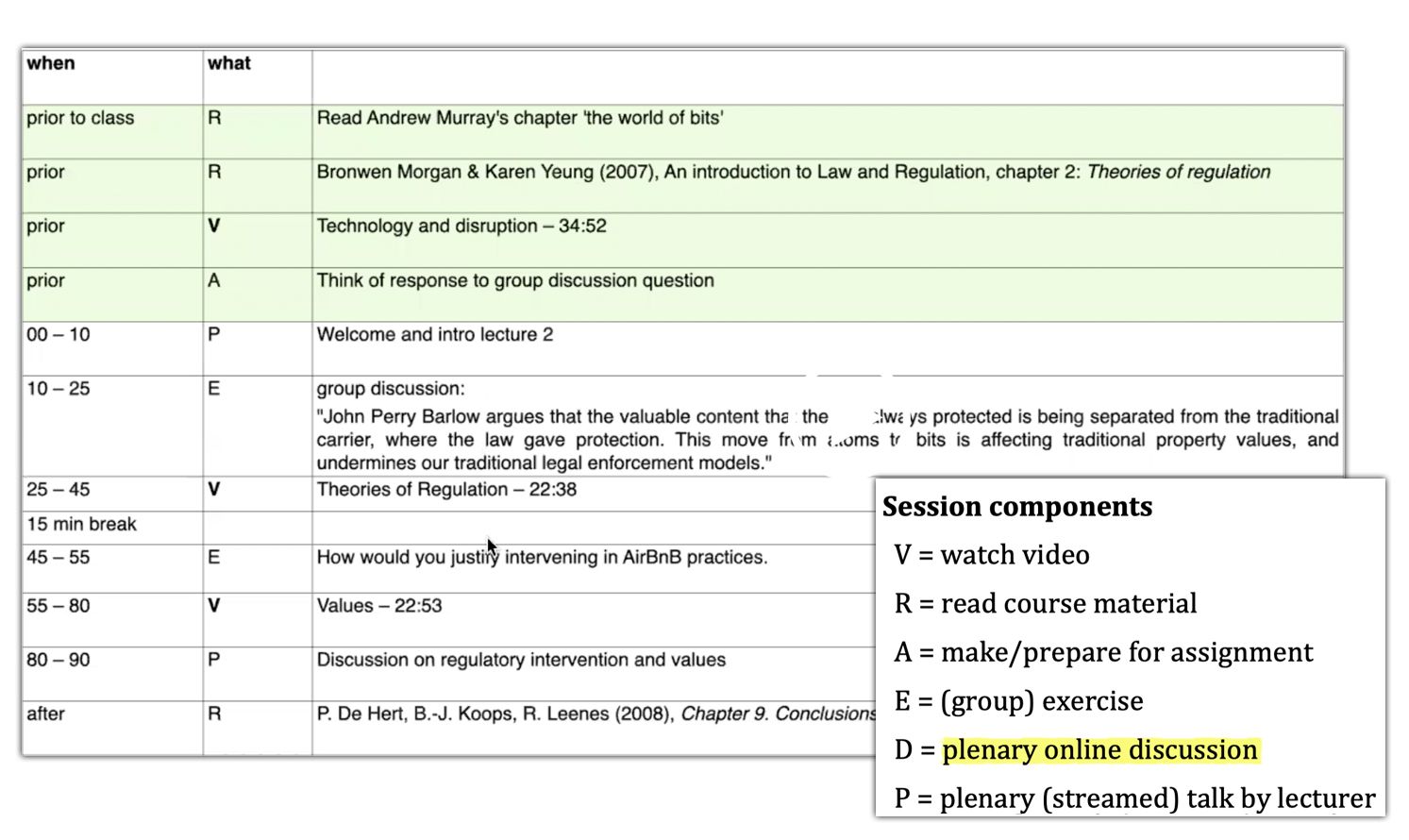
The Nine Day Wonder: Lack of Coding for Lawyers
As claimed by Dr. Thibault Schrepel, any Law & Tech master student should not leave the school without gaining the basic knowledge of coding. I was surprised that TiU did not offer this course, although the Law and Technology master program is one of the long-standing master programs in this field. On the other hand, video lectures in a 100-person online class may not be suitable for teaching technical subjects. On this occasion, MOOCs (massive open online courses) may help the integration of coding into the master program. For instance, getting a certificate from a MOOC related to coding might be considered in lieu of a three credit course for the master program.
I was also surprised that they don't offer any courses related to legal tech and legal design. Many legal practitioners believe that students should be aware of these paradigms in the data-driven professional legal world. Prof. Dr. Erik Vermeulen should be mentioned at this point. He gives lectures related to legal design in the International Business Law master program at TiU. I had a chance to meet him through an online conference organised by the e-Law student association. I think it would be a great addition to the program if he teaches his coding for lawyers course. For those interested, he shares his inspirational thoughts on the new wave of instructing and novel paradigms in academia on his blog.
Hard-Law Perspective: Mainly from Data Protection
It could be argued that Tilburg's master program on law and technology is predominantly based on a hard-law perspective. As for the details, the program includes two courses related to data protection which encapsulates numerous regulations such as the ECHR, the Convention 108+, the GDPR, the e-Commerce Directive, the Police Enforcement Directive, etc. Moreover, almost every course indirectly touches upon data protection related topics as well as the core regulations on their subjects such as the e-Signature Directive, the Cyber-Security Act, IP regulations, consumer directives, and so on. This makes sense to me because, from my perspective, the EU has opened the path of law & technology mainly with data protection regulations such as the Data Protection Directive of 1995. Even the EU proposals regarding AI, digital services, and digital governance may be considered highways of this road. Courses in the master program have persuaded me that data protection is a kind of basis for all law and technology topics in the EU.
TiU also offers the previously mentioned REAL course to balance this predominant hard-law perspective. It was the most impressive and eye-opening course concerning the background of hard-law instruments mentioned in the other courses. In this course Prof. Dr. Leenes introduced the law, technology, and society model, which shows the complicated relationship between new technologies and law. It included points related to new technology, issues of that technology and how to intervene in the existing legal landscape by soft and hard regulation models, namely law, norms, market, and architecture. It was also the most challenging course for the beginners of the program. I should also take time to mention a rumour, which lined the corridors of the online program: if you pass this course, you are ready to be a proud graduate of the Law & Technology program.

A Bachelor’s Degree Rival: Law & Tech Master’s Quotas
I experienced Tilburg University offline mode on campus for just a day in 2019. It was the first day of the 2019-2020 academic year: a shiny and actual education day in TiU. I was there to decide whether registering for the Law & Technology master program was worth it. The first lecture was given by Prof. Dr. Leenes. As I remember, approximately 60 students were in the classroom. Many students were disturbed by the crowd. Impressed by the lecture, I registered for the master program and the COVID19 devil entered our lives in 2020. This time, Leenes's class had about 100 registered students. Because we were all little icons in the Zoom sessions, we could not be fully aware of the crowd. However, my colleagues and I were also disturbed that there were so many of us for a master program.
It can be argued that master programs are evolving as a valuable source of income for universities in the UK and the US, rather than carrying the pure objective of educating students in a specific field. From my perspective, high tuition fees and student quotas of master programs demonstrate the situation. With its student quota and relatively high tuition fees, TiU, unfortunately, may also be seen in the cluster of these universities. Exceptionally at least, TILT employs plenty of researchers that cannot be compared to other institutes.
Formulation of a Research Question and the Thesis Journey: A Bumpy Ride
Although there were so many of us, the master program coordinators managed this situation well in the thesis trajectory process. They formed fourteen thematic groups to catch all students' attention according to their academic interests. They were flaming cocktails of data protection, IP rights, rapidly developing complex digital technologies, digital competition law, ethics and data science, fintech, regtech, and sustainable energy. Generally, each group had two supervisors, one professor and one PhD candidate. I chose the group on selected issues of data protection whose supervisors were Dr.Nadezhda Purtova and Magdalena Brewczyńska.
The journey started with writing the thesis proposal and creating the research design. My proposals were rejected three times because the formulation of my research question was not sufficiently clear. I learned a lot about crystalising the research question, research objectives and literature gap in this process. In fact, when I came back to Turkey to proceed with my PhD adventure, I immediately deleted ten previously written pages. I formulated a novel strong research question according to the methodology I learned in Tilburg. I would like to take this occasion to thank my supervisor Dr.Nadezhda Purtova, again.
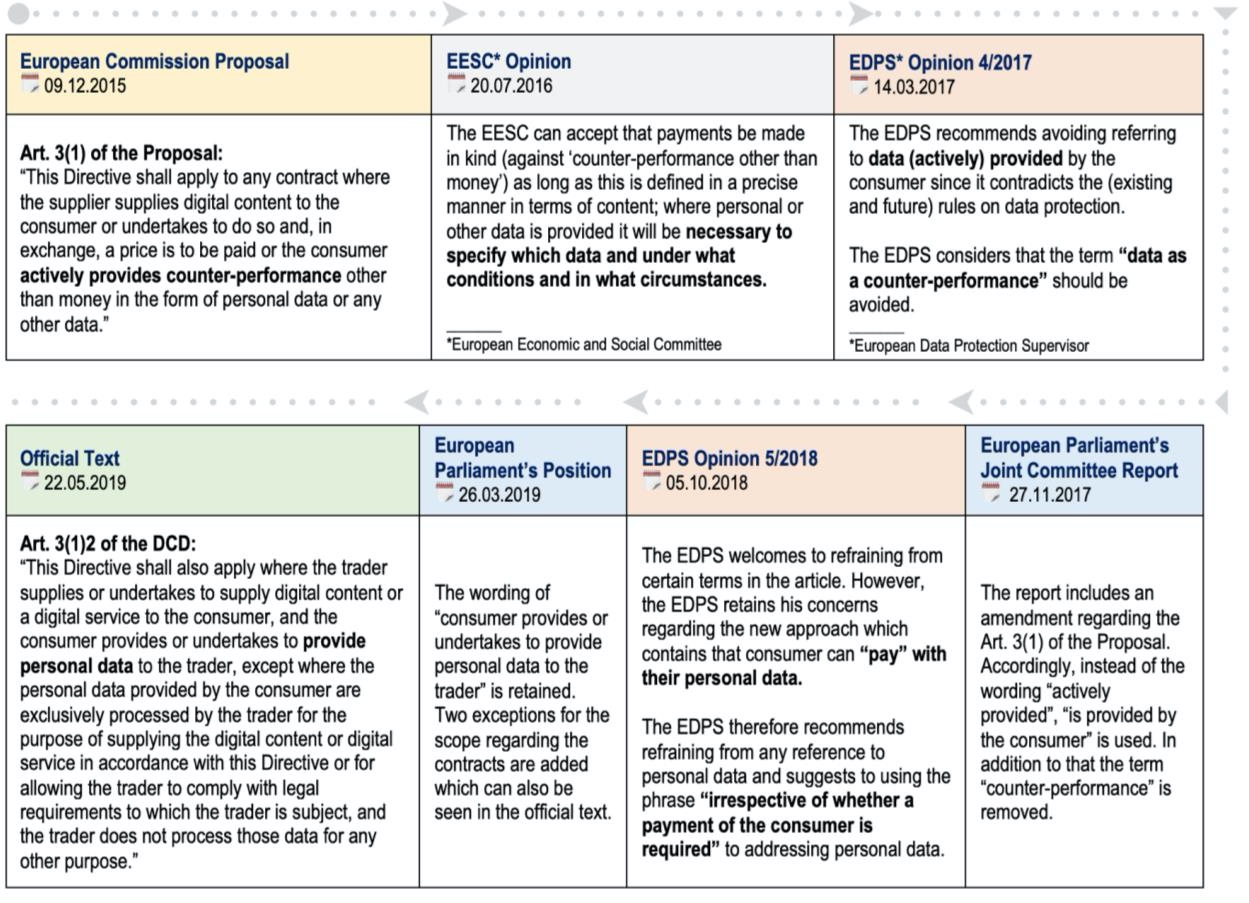
Microphone Crisis -not diplomatic-
I experienced this program entirely via Zoom sessions. We, as students, were small fluffy images on the screen along with the lecturers, and using microphones was the only way that connected us to each other. Interestingly, certain knowledge clips in a course were fluffy too. Since we were in the middle of the COVID19 pandemic and the University’s expenses had decreased significantly, why were the lecturers not provided with average quality microphones? Similarly, why did they not invest in sound editing software and human resources in this area? These questions were soaring through my mind during live sessions of that course, where we had yet to hear an unmuffled sound from the lecturer. Sometimes, significant parts of the lecture could not be understood by students. Yes, it was certainly a crisis, in the form of an ill-working microphone!
Take Extra Care of Your Eyes!
I would like to share my reading experience in Tilburg in the shadow of COVID19. I did not attempt to count the total pages of the reading materials, but it is beyond doubt that there were at least five thousand pages to be read in the program. And I did not print any of them. I originally had plans to buy a printer to get rid of screens at the beginning of the first semester. Trying to catch up with the program in the first month ruled out that plan. Also, I loved the idea that if I read on screen, I would access all my highlights afterwards. The result? My eye prescriptions have decreased by half a diopter for each eye, that’s -0.5 points for my non-medically-native readers (very much like myself). I wouldn't have noticed if my glasses were able to resist this technology-related program and not broken the day after I submitted the last chapter of my thesis.

I advise those who will start this program to take extra care about their eye health. This does not mean think about trees. You can strike a fair balance between your eyes and trees (you will hear of this “balancing” in almost every lecture, be prepared!). Don't tell her, but you can legitimise your balancing exercise by thinking about one lecturer who printed out the exam papers written in a digital environment. (Yes, she printed out our answers which were filled digitally and marked manually, scanned again and assigned each of them for each student. Yes, this occurred in a law and technology LL.M. program).
***
These are just a few remarks of what my COVID19 academic experience at Tilburg University looked like. As you would appreciate, it would be impossible to put everything in one blog post. Just to highlight again, my expectations were met at this program, and I strongly suggest applying for this program in order to broaden your horizons on the intersection of law, technology, and society. Last but not least, I would like to take this opportunity to thank the Jean Monnet Scholarship Office staff in Turkey for their kind and outstanding support throughout the year, in every step.

